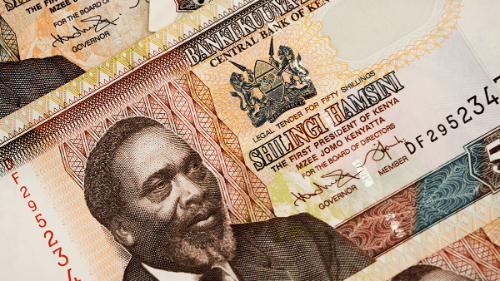Kenya’s Shilling Faces Pressure Amid Slowing Economic Growth

TLDR
- Kenya’s shilling, the world’s best-performing currency earlier this year, risks losing its stability as economic growth falters
- The currency rallied 21% in the year’s first seven months but has since hovered around 129 per dollar
- The rate is supported by central bank interventions, high interest rates, and foreign-exchange trading rules
Kenya’s shilling, the world’s best-performing currency earlier this year, risks losing its stability as economic growth falters. The currency rallied 21% in the year’s first seven months but has since hovered around 129 per dollar, supported by central bank interventions, high interest rates, and foreign-exchange trading rules.
However, economic challenges, including flooding in April and ongoing anti-government protests since June, have slowed growth. The World Bank has revised Kenya’s growth estimates down to 4.7% in 2023 and 5% in 2024, from earlier projections of 5% and 5.3%.
Kenya’s dependence on external factors like remittances and commodity exports, combined with sluggish manufacturing growth and high taxes, points to a lack of structural reforms. Analysts warn that without intervention, the shilling could weaken, potentially trading between 150 and 200 per dollar. The Central Bank of Kenya has pledged to defend the currency using its $8.97 billion in foreign reserves, but declining reserves raise concerns about long-term sustainability.
Key Takeaways
The shilling’s stability highlights Kenya’s reliance on external financial flows rather than robust domestic economic activity. Factors such as slowing growth, inadequate structural reforms, and global volatility pose significant risks. While the Central Bank of Kenya continues to intervene, its ability to maintain the currency’s strength could be limited if reserves dwindle further. Kenya’s economic challenges also mirror broader trends in developing economies grappling with external shocks and insufficient domestic reforms. For Kenya to maintain currency stability and sustainable growth, structural adjustments in manufacturing, tax policy, and export diversification will be essential. Without these, the shilling’s short-term strength may not hold, leading to potential inflationary pressures on imports and broader economic instability.

Next Frontier
Stay up to date on major news and events in African markets. Delivered weekly.
Pulse54
UDeep-dives into what’s old and new in Africa’s investment landscape. Delivered twice monthly.
Events
Sign up to stay informed about our regular webinars, product launches, and exhibitions.




